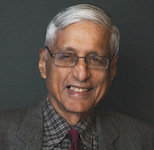The Growing Concern Over Action Against Dissenters In India
With screaming headlines competing for our attention, including those about the barbaric murder in Udaipur, it was easy to overlook Prime Minister Modi's sudden descent at Abu Dhabi. However, global watchers like the online journal, The Times of Israel, noticed it. That journal wrote:
"Indian Prime Minister Narendra Modi arrived in the United Arab Emirates on Tuesday, just weeks after a top Indian official's remarks about the Prophet Mohammed set off anger in the Gulf."
"The one-day visit by Modi, who is heading back to India after attending the G7 summit in Germany, follows protests by Gulf states earlier this month after a spokesperson for his party made disparaging remarks about the Prophet Mohammed on TV. The UAE and Saudi Arabia condemned the comments, while Qatar and Kuwait summoned their Indian ambassadors. One Kuwaiti supermarket took Indian goods off its shelves."
"The two countries enjoy strong trade and cultural ties, with Indians making up 35 percent of the UAE's 10 million population, the biggest expatriate community."
Not surprisingly, the Indian media has featured Mr. Modi's expression of thanks to the UAE president, Mohamed bin Zayed Nahyan, for "taking great care of the 3.5 million Indian community in UAE, especially during the Covid-19 pandemic." Releasing Mr. Modi's remark to the media, India's Ministry for External Affairs tried to link it to Covid, but the Israeli journal knew better. Like Mr. Modi, The Times of Israel understood that events inside India wreak consequences on the heads of Indians living outside, who number in tens of millions across the world.
Before he landed at Abu Dhabi (where the ruler was at the airport to greet him), Mr. Modi had been in Schloss (i.e. Castle) Elmau in Germany's Bavarian region, invited there to join some of the "G 7" sessions. The leaders of Indonesia, Argentina, South Africa and Senegal too were invited. Since President Joko Widodo of Indonesia is the current chair of the larger "G 20" set of nations, he understandably stands in the middle in this Schloss Elmau video, flanked by Joe Biden and the German chancellor, Olaf Scholz. Our Prime Minister can be seen standing at far left.
When, leaving out the special invitees, "G 7" leaders from the U.S., Germany, France, Britain, Japan, Italy, and Canada conferred among themselves, they vowed increased support for Ukraine that continues to be battered by Russia which in recent battles has gained significant ground, though at great and probably unsustainable cost. The "G 7" and many other nations see Ukraine's defense against Russia's attacks as a battle of democracy (or the democracies) versus autocracy. The special invitees to Schloss Elmau did not necessarily share that view, and it seems that India does not.
However, on Monday, June 27, Prime Minister Modi signed the following significant statement at Schloss Elmau: "We, the Leaders of Germany, Argentina, Canada, France, India, Indonesia, Italy, Japan, Senegal, South Africa, the United Kingdom, the United States of America, and the European Union, affirm our commitment to strengthening the resilience of our democracies..."
"In recognition of the dramatic changes in the geopolitical situation...and the significant threats to democratic systems around the world, we remain steadfast in our commitment to defending peace, human rights, the rule of law, human security and gender equality."
"We hail all courageous defenders of democratic systems that stand against oppression and violence."
On that very day, June 27, Mohammed Zubair, co-founder of the fact-checking website Alt News, was arrested in Delhi. Two days earlier, an Anti-Terrorism Squad of the Gujarat police had descended on the Mumbai home of one of India's most respected human rights activists, Teesta Setalvad, and arrested her. "Can hypocrisy be starker?" is the question leaping up in countless Indian minds. And many non-Indian voices too, including in the "G 7" countries, have already demanded the release of these courageous and diligent individuals who belong to the ranks - "hailed" by Modi, Widodo, Biden, Schloss, and company - of the "defenders of democratic systems that stand against oppression and violence".
What those who gathered at the Elmau castle said to one another face-to-face may not come to light very soon, but there should be no doubt on one score. The standing of the Indian government is slipping among the citizens of the world. In private and public comments, the world is asking questions like the following. Is it a crime in today's India to seek justice on behalf of cruelly murdered people? Is it a crime to correct fake news? Is silent submission the only safe response to oppression, slander, and disinformation? And Indians across the world may have to start figuring out how to hide themselves when asked about justice in India.
When he thanked the UAE chief for "taking great care" of the millions of Indians living in that Arab country, Mr. Modi was expressing his awareness that Indians are part of a larger humanity and live amidst Christians, Muslims, Buddhists, Jews, and others whose goodwill they need. Mr. Modi should also recognize that the Indian state cannot cut itself off from the world, or, like a North Korea, shut itself behind a thick curtain. India and the world cannot live without each other.
It may prove foolish to think that the ongoing war between Russia and Ukraine, or the rising inflation that currently troubles almost every nation, will be so preoccupying that the world will ignore the persecution of the government's critics, or silently watch the emergence in India of a state that suppresses minorities and dissenters.
